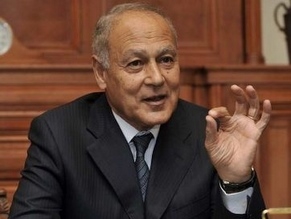|
World Jewish News

Egyptian Foreign Minister Ahmed Aboul Gheit on Dec. 9, 2010. Photo by: AP
|
U.S., Egypt exchange verbal blows over inability to quell persisting unrest
09.02.2011, Israel and the World U.S. -Egypt ties grew tenser Wednesday, as Egypt's foreign minister rejected U.S. calls for the immediate repeal of its emergency law and said Washington seemed to be trying to impose its will on Cairo, while the White House critisized Cairo for its lack of reform.
Ahmed Aboul Gheit's comments came as U.S.-Cairo ties, which had already been strained by the civilian protests sweeping Egypt in recent weeks, seem to have taken a turn for the worse, with the White House openly criticizing Cairo's attempts for democratic reform.
Speaking to reporters on Wednesday, White House spokesman Robert Gibbs said that "what you see happening on the streets of Cairo is not all that surprising when you see the lack of steps that their government has taken to meet their concerns.
Responding to a question asking if Egyptian Vice President Omar Suleiman's vision for a transition process was in line with the U.S. vision, Gibbs said: "I think the process for his transition does not appear to be in line with the people of Egypt.
"And I think we believe that more has to be done. And I think, more importantly, the people of Egypt think more has to be done," Gibbs said.
Discontent was also noted from the Egyptian side, however, when Foreign Minister Aboul Gheit, when asked if he viewed advice provided by U.S. Vice President Joe Biden on Tuesday as helpful, told the PBS NewsHour program on Wednesday "not at all," according to an interview transcript provided by the U.S. TV broadcaster.
Biden set out four steps the United States wanted Egypt to take, telling it to stop harassing protesters, to immediately repeal the emergency law allowing detention without charge, to broaden participation in a national dialogue to include more opposition members and to treat the opposition as a partner in devising a road map to end Egypt's political crisis.
Asked why he found this unhelpful, Aboul Gheit told PBS: "Because when you speak about prompt, immediate, now -- as if you are imposing on a great country like Egypt, a great friend that has always maintained the best of relationship with the United States, you are imposing your will on him."
He also said he was astounded Biden had called for ending the emergency law as the government grapples with mass street protests now in their third week.
"When I read it this morning I was really amazed because right now, as we speak, we have 17,000 prisoners loose in the streets out of jails that have been destroyed. How can you ask me to sort of disband that emergency law while I'm in difficulty?" he said. "Give me time, allow me to have control to stabilize the nation, to stabilize the state and then we would look into the issue."
Commenting on the Egyptian FM's comments from earlier in the day, State Department spokesman Philip J. Crowley claimed that, as opposed to Aboul Gheit's claims, American was "not trying to dictate anything."
"As we've said and emphasized many times, there will be an Egyptian solution, and Egyptian actions within this orderly transition," Crowley said, adding that it was "important that what Egypt does do is seen as credible in the eyes of the Egyptian people, and it's our view that what they've put forward so far does not meet that threshold."
The State Department official then added that the U.S. did not consider that view as " interference."
As we evaluate this process and we evaluate what's going on, it is our view that the Egyptian government needs to show that it is serious about pursuing this transition," Crowley said, adding that: "With all due respect, it's less about what we think."
"It's more about what the people of Egypt thinks -- what they think. There have been pledges made by the government. There have been commitments that have been advanced by the government. And now it's important to have -- real actions that are consistent with those pledges," he said.
"With all due respect to the foreign minister, he should not be Amazed at our call for rescinding emergency law. We have been calling for that for years, if not decades," the U.S. official said, adding that what Washington wanted to see was "fair and credible elections."
Haaretz.com
|
|
